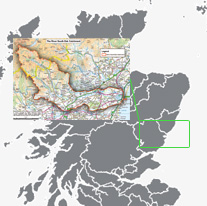Double boost for species as major work starts at Angus river
Improvements at an Angus river as part of a £3.5 million UK project to improve habitat for freshwater pearl mussels and salmon are set to go ahead next week.
The Pearls in Peril project (PIP) will see 873 metres of boulder bank protection removed from sections of the River South Esk and its White Water tributary in Glen Clova and Glen Doll.
Work is expected to start on 6 July.
The South Esk is a site of European importance as a Special Area of Conservation (SAC) for its pearl mussels and salmon. And it is high priority site due to an increase in illegal exploitation reported in the area.
The bank protection was installed in the 1990s to limit riverbank erosion and channel movement. This reduced river habitat quality for freshwater pearl mussels, salmon and trout.
And the boulders’ removal will make the riverbank more accessible for water voles around one of the restoration sites.
This new population was only found last summer by PIP survey staff – the first record of these rare mammals for this part of Glen Clova.
Dr Lorna Wilkie, project officer from the Pearls in Peril Project, said: “Freshwater pearl mussels in the River South Esk have been affected by pollution, illegal fishing, and river engineering.
“Habitat loss has made it impossible for populations to recover. But by increasing suitable habitat for juvenile mussels and spawning salmon PIP aims to increase their number and distribution.
“Although changes to the river environment will be immediately noticeable, we do not expect to see an increase in the mussel population for many years. Freshwater pearl mussels are very slow-growing – they don’t start breeding until they are 15-20 years old and can live for up to 120 years. PIP is a project with long-term aims.”
Freshwater pearl mussels are rare molluscs that live in the gravel beds of clean rivers. They feed by filtering water and removing fine particles. This helps keep our rivers clean and benefits other species like salmon and trout.
The mussels are critically endangered and Scotland is one of their few sole strongholds.
Mussel larvae spend the first few months of their lives attached to the gills of young salmon and trout, so healthy fish populations are vital to their lifecycle.
Freshwater pearl mussels have historically been fished for the pearls they can produce, similar to an oyster. However, they very rarely contain pearls and they are fully protected under law – it a crime to kill, injure, take or disturb them.
Chief Inspector Colin Gough of Police Scotland said: “Police Scotland welcomes any improvements made to allow fresh water pearl mussels to thrive. This latest project in addition to the ongoing wider work of PIP is to be commended and will be fully supported by Police Scotland.
“Police Scotland will continue to work in close partnership with the Pearls in Peril LIFE+ project by supporting their river patrols, investigating any reports of this type of crime and undertaking enforcement action wherever possible. We would encourage members of the public to remain vigilant when out and about over the summer and to report any suspicious behaviour to police."
PIP is funded through the European Commission LIFE Nature programme and 22 UK organisations.
During the works there may be some minor disruption to footpaths and tracks. Signs and alternative routes will be in place and information about these will be displayed in the Angus Glens Ranger Centre at Glen Doll and on the PIP website.
In addition the Pearls in Peril project is also working to increase awareness of illegal pearl fishing and will launch a Riverwatch Scheme for the River South Esk at Montrose Basin SWT Reserve on Tuesday 7 July at 7pm.
The Riverwatch initiative is part of the Pearls in Peril project which aims to safeguard freshwater pearl mussels, a critically endangered species threatened by illegal pearl fishing that has taken place over Scotland. The scheme relies on using the local community and river users as volunteers to protect pearl mussels by increasing awareness and vigilance.
If you would like to be involved and kept up to date with the progress of the programme please visit our website www.pearlsinperil.org.uk. You can also follow us on Twitter @mothemussel or Facebook https://www.facebook.com/pages/Mo-the-Mussel-Pearls-in-Peril-EU-Life-Project/302827496572607?


